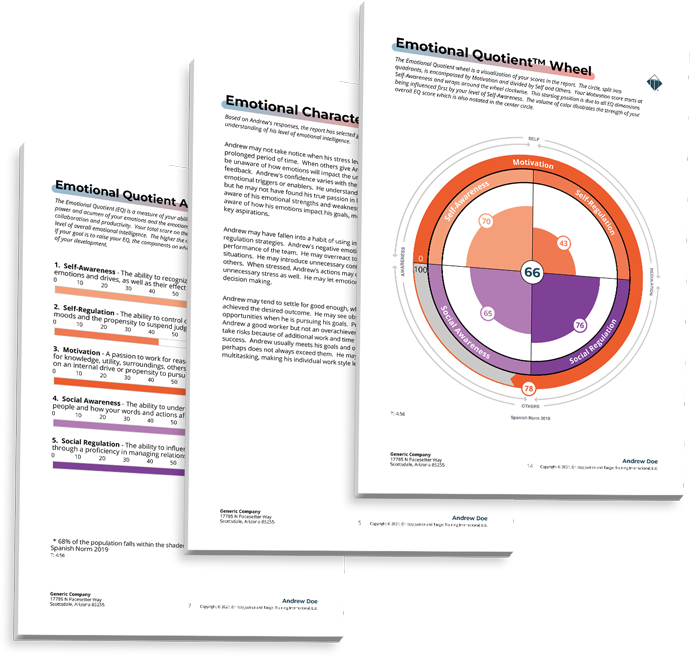Emotional Intelligence and the EQ Assessment: What You Need to Know
Now more than ever, emotional intelligence is the key to creating a healthy and well-functioning workplace. If you’ve ever had questions about what emotional intelligence is exactly, or how you can apply your emotional quotient (EQ) score to your work and life right now, we have answers.
Here Is Everything You Need to Know About Emotional Intelligence and EQ
- What is Emotional Intelligence?
- Why is Emotional Intelligence Important Right Now?
- How Does Emotional Intelligence Help You?
- What Does the EQ Assessment Measure?
- Why Did TTI Success Insights Create the EQ Assessment?
- What Type of EQ Reports Can Be Generated?
- What’s Your Next Step with EQ?
What is Emotional Intelligence?
Emotional intelligence is the ability to sense, understand and effectively manage your emotions and the emotions of people around you. The phrase ‘emotional intelligence' was popularised by Daniel Goleman in the mid-90s. We have written The History of Emotional Intelligence, which may be of interest to you.
EQ stands for Emotional Quotient. EQ is a measure of our emotional intelligence that indicates how actively we apply the principles of emotional intelligence.
Why is Emotional Intelligence Important Right Now?
Emotional intelligence might be the most important skill any professional can develop in our modern workplace.
Fast Company reported on a study that showed “85% of participating companies' financial success was due to skills in “human engineering”, personality, and ability to communicate, negotiate and lead. They found that only 15% was due to technical ability. In other words, people skills or skills highly related to emotional intelligence were crucial skills.”
Moving forward, that ‘human engineering’ will be crucial for business leaders to develop and thrive. People skills and often-labelled ‘soft skills’ are leading the way, and increasing your awareness to improve emotional intelligence will help you remain competitive.
The new world of work is putting people first.
How Does Emotional Intelligence Help You?
If you’re working on a team, building your awareness through emotional intelligence will transform your interactions with your boss and peers. You’ll be more aware of your emotions and in control of your reactions to conflict. “As we get more and more entrenched in people-driven interactions, EQ is a critical piece to focus on,” said TTI Success Insights President. “You will frustrate and isolate people if you don’t have it.”
If you’re a leader, developed emotional intelligence is central not only to your development, but to the development of your team. Leaders need to know how to speak confidently, understand and empathise with the needs of others, and read a room quickly to communicate in an impactful way.

What Does the EQ Assessment Measure?
EQ is a measure of your ability to sense, understand and effectively apply the power and acumen of your emotions and the emotions of others to facilitate higher levels of collaboration and productivity.
Our EQ assessment focuses on two core areas of emotional intelligence: Intrapersonal and interpersonal emotional intelligence. The assessment breaks these two areas into the five dimensions of emotional intelligence: self-awareness, self-regulation, motivation, social awareness and social regulation.
This assessment builds deep self-understanding by indicating if the individual actively applies the principles of emotional intelligence.
Why Did TTI Success Insights Create the EQ Assessment?
The EQ assessment was created in 2008 and has been updated in 2011, 2015, and 2018. The TTI Success Insights model is based on the work of Dr. Izzy Justice, who utilised the works of Goleman’s 1995 Emotional Intelligence framework. Wanting to work with an assessment developer that shared his vision and drive in the realm of emotional intelligence brought him in contact with TTI Success Insights.
TTI Success Insights and Dr. Justice’s EQ assessment allows people to dive into the science of emotional intelligence through a personalised lens. Becoming aware of their own emotional state and those of others is the first step to improved performance.
What Type of EQ Reports Can Be Generated?
Personal reports are the first steps to reveal an individual’s EQ. Personal reports are available for Management-Staff, Sales or Executive.

EQ is commonly paired with other assessments. For example, Behavioural Intelligence is a double-science report combining DISC and EQ to provide insight into HOW we behave as well as DO we actively apply the principles of emotional intelligence.
Another example is the TriMetrix EQ assessment, which is a triple-science report combining DISC, Driving Forces and EQ to provide insight into HOW we behave, WHY we move into action, as well as DO we actively apply the principles of emotional intelligence.
What’s Your Next Step with EQ?
Take some time to review a sample report through this link. You can select an EQ report on its own or one of the multi-science reports.
If you would like to introduce and integrate emotional intelligence into your business to support professional development, we invite you to consider the Science of Self™ Accreditation.
Emotional intelligence is the key to the new world of work.
Note: This article was originally published by TTISI USA on 9 July 2020 by Jaime Faulkner. It has been updated for the Australia and New Zealand market, and it has been shared here with permission.

Trevor O'Sullivan
General Manager. Since the early 2000s, Trevor has worked with thousands of Talent Management professionals to develop and apply assessment-based talent management solutions for selecting, developing and managing people. Trevor is an active member of the TTI Success Insights (TTISI) Global Advisory Council, contributes to TTISI product development and is a regular presenter at TTISI-R3. He is honoured to have received multiple Blue Diamond Awards and, more recently, the Bill Brooks Impact Award recognising his contributions to the TTISI global network.

/emotional%20%20quotient.png?width=374&name=emotional%20%20quotient.png)
/4%20%20Ways%20to%20improve%20Emotional%20Intelligence.png?width=374&name=4%20%20Ways%20to%20improve%20Emotional%20Intelligence.png)
We Would Like to Hear From You (0 Comments)